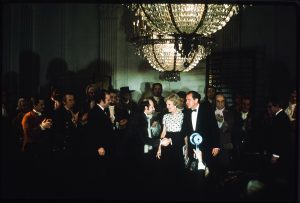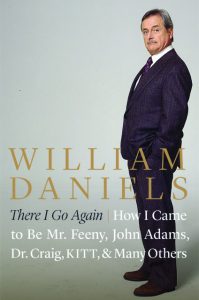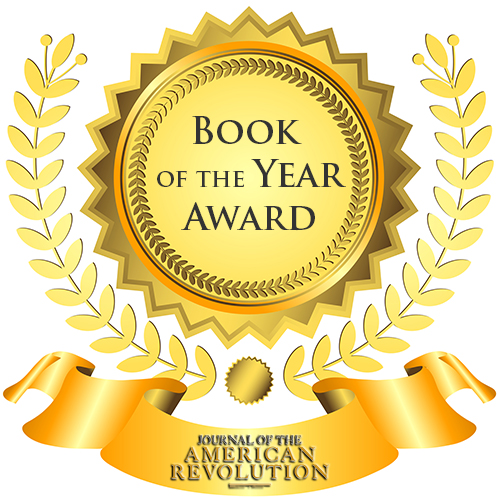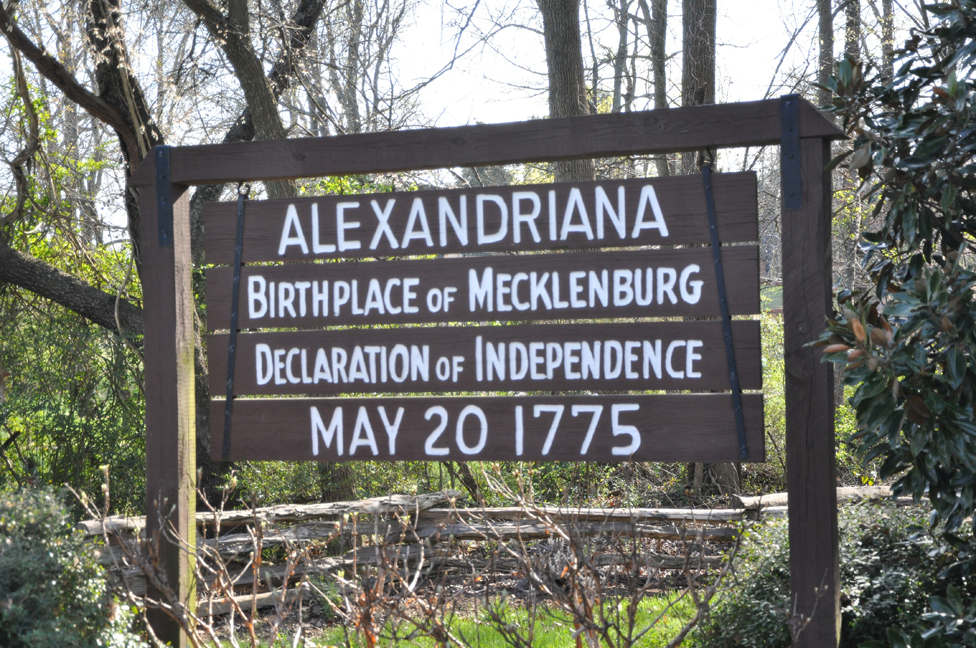He describes it as “the best role” of his career. Yet actor William Daniels, whose portrayal of John Adams in both the Broadway and movie versions of 1776 – the Tony Award-winning musical about the signing of the Declaration of Independence – left an indelible mark on a generation of theatergoers, film aficionados and history buffs, also refers to the part as one of the two most challenging he has ever played.
His other most challenging role? That would be playing Adams’ son, John Quincy Adams, in PBS’s epic thirteen-episode miniseries, The Adams Chronicles.
And, lest anyone forget, he also played Samuel Adams in Universal’s television adaptation of The Bastard.
“I cornered the market on playing members of the Adams Family,” jokes the actor, who turns ninety years old on March 31. “All except Abigail.”

Next month is also when Daniels’ eagerly anticipated memoirs, There I Go Again: How I Came To Be Mr. Feeny, John Adams, Dr. Craig, KITT and Many Others (University of Nebraska Press / Potomac Books) is due out. Fans of the Brooklyn-born actor will find the book to be a veritable treasure trove of recollections spanning Daniels’ nearly eight decades as a performer, starting from the time he and his sister, Jackie, first appeared as a song-and-dance act on a WMCA Radio program called The Nick Kenny Children’s Show right up to his most recent reprisal of teacher George Feeny – the part he played for seven years on ABC’s Boy Meets World – on the Disney Channel reboot, Girl Meets World.
Having appeared in the original productions of A Thousand Clowns, One Flew Over the Cuckoo’s Nest and On a Clear Day You Can See Forever, Daniels, whose big break in the theater was co-starring in The Zoo Story – Edward Albee’s first play to be produced in New York – was already a successful stage actor when he auditioned for the role of John Adams. But things didn’t start off very well. Though the auditions were at the Ziegfeld Theatre, Daniels instead went to the Forty-Sixth Street Theatre – where the show was opening and which is now home to Hamilton.
“I backed into a great role,” he writes.
But the part became more than just a great role. “I became committed to this role in a way I have never done with any other,” he continues. With nine songs – two of them solos – and dialogue that was “persuasive and challenging,” rather than conversational, Daniels adds how he “soon realized how vocally demanding this role would be.”
All told, Daniels played Adams on Broadway for two and half years, and only missed two performances. He spent another thirteen weeks in Hollywood filming the movie version.
By 1976, he wasn’t anxious to play John Adams again. However, Daniels says he was “surprised and delighted” when he was offered the role of John Quincy Adams in The Adams Chronicles.
In both the stage and film versions of 1776, Adams argues for the end of slavery. But in the final version of the Declaration, the abolition of slavery was jettisoned in order to placate the southern colonies.
In The Adams Chronicles, John Quincy Adams continues his father’s work on abolishing slavery, defending the group of Mende (African) tribesmen who were detained by the federal government in 1839 after staging a revolt aboard the slave ship La Amistad bound for America.
Daniels had no problem understanding his character’s motivation. While attending Northwestern, Daniels and his future wife, actress Bonnie Bartlett, were used to being taken to many of the nightclubs in Chicago by Bartlett’s brother, who helped the likes of Nat King Cole, Duke Ellington and Billie Holiday find housing in Moline, Illinois after being denied lodging in “white only” hotels.
Further, as an eight-year-old, Daniels penned the only fan letter he would ever send to Bill “Bojangles” Robinson, and received a handwritten reply from the performer inviting him and his mother to be his guest at The Cotton Club. “Can you imagine anyone of his prominence doing that today?” asks Daniels in the book. “What a man!”
Stricken with appendicitis during production of The Adams Chronicles, Daniels recounts how he was back on the set ready to film a scene in which John Quincy Adams brings United States v. The Amistad before the United States Supreme Court: “Moving gingerly and without much strength or energy after my recent surgery, I didn’t have much to do to act seventy-four, John Quincy’s age at the time…. according to Bonnie, my ‘decrepitude’ made the performance quite convincing.”
 “In real life,” he adds, “Adams actually collapsed and died after making his great oration.” Since the government had given PBS permission to film in the old Supreme Court building, Daniels got to sit at the very desk that John Quincy Adams used when arguing his case.
“In real life,” he adds, “Adams actually collapsed and died after making his great oration.” Since the government had given PBS permission to film in the old Supreme Court building, Daniels got to sit at the very desk that John Quincy Adams used when arguing his case.
Two years later, Daniels completed his trifecta when he was offered the part of Samuel Adams in The Bastard. “Samuel Adams was a firebrand, he wasn’t like John at all,” Daniels told a caller a few days before Thanksgiving Day last year. “John was a great intellectual, an extraordinary man and others were of a lesser ilk.”
Of course, the running joke in 1776 is that John Adams views himself as “obnoxious and disliked” – a characterization that Adams himself owned up to in his personal correspondence.
And in their historical notes to 1776, librettists Peter Stone and Sherman Edwards admit that, at times, John Adams is a composite of himself and his cousin. Even in the film adaptation of 1776, actor Howard Da Silva, who portrayed Benjamin Franklin, tells Daniels’ John Adams that “If Sam Adams can’t put up with you, no one can.”
Author John Jakes says he got the chance to meet Daniels when he was on the set of The Bastard – the first book in his eight novel saga, The Kent Family Chronicles. “I was still enthralled by his portrayal of John Adams, which I had seen on Broadway,” the acclaimed author of the North & South trilogy wrote in an email. And while it’s been years since he did any research on the American Revolutionary War, Jakes is of the opinion that Samuel Adams “was somewhat coarser – a rabble-rouser. But regardless of who Daniels portrays, I have always considered him a superb actor,” said Jakes.
Few would disagree.








5 Comments
Whenever I read something written by John Adams, it is William Daniels’ voice I hear in my head.
For me too it’s always in Daniels’ voice in my head. He was also great on St. Elsewhere.
He brought John Adams with all his obnoxious brashness to life for me.
Paul Giamatti played a great John Adams in the HBO miniseries. He’s of the finest character actors of our time. However, with all due respect to Mr. Giamatti, William Daniels is John Adams. Always be.
You left out that William Daniels was also the voice of John Adams in the A&E documentary “The American Revolution”.
In “1776” William Daniels made me fall in love with John Adams n every time I watch the movie I fall in love with John Adams AND William Daniels all over again. A favorite movie and Broadway show and a John Adams/William Daniels who never fails to delight. Kudos Mr. Daniels and THANK YOU!